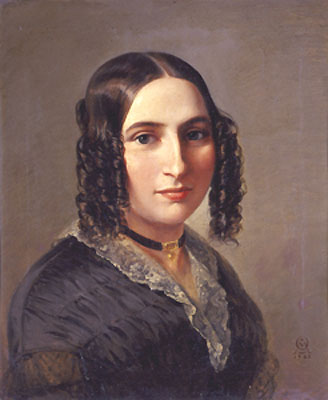<Back to Index>
- Anatomist Marie François Xavier Bichat, 1771
- Composer Fanny Cäcilie Mendelssohn, 1805
- King of England, Scotland and Ireland William III, 1650
PAGE SPONSOR


Fanny Cäcilie Mendelssohn (14 November 1805 – 14 May 1847), later Fanny Hensel, was a German pianist and composer, the sister of the composer Felix Mendelssohn and granddaughter of the philosopher Moses Mendelssohn. She was the grandmother of the philosopher Paul Hensel and the mathematician Kurt Hensel.
Fanny Mendelssohn was born in Hamburg, the oldest of four children. She was descended on both sides from distinguished Jewish families; her parents were Abraham Mendelssohn (who was the son of Moses Mendelssohn and later changed the family surname to Mendelssohn Bartholdy), and Lea, née Salomon, a granddaughter of the entrepreneur Daniel Itzig. Fanny benefited from the same musical education and upbringing as her brother Felix, sharing a number of his music tutors, including Carl Friedrich Zelter. Like Felix (who was born in 1809), Fanny showed prodigious musical ability as a child and began to write music. Visitors to the Mendelssohn household in the early 1820s, including Ignaz Moscheles and Sir George Smart, were equally impressed by both siblings. She may also have been influenced by the role models of her great aunts Fanny von Arnstein and Sarah Levy, both lovers of music, the former the patroness of a well known salon and the latter a skilled keyboard player in her own right.
However, she was limited by prevailing attitudes of the time toward women, attitudes apparently shared by her father, who was tolerant, rather than supportive, of her activities as a composer. Her father wrote to her in 1820 "Music will perhaps become his [i.e. Felix's] profession, while for you it can and must be only an ornament". On the other hand, Felix was supportive of her, as a composer and a performer, although cautious (professedly for family reasons) of her publishing her works under her own name. He did however arrange with her for a number of her songs to be published under his own name. In turn Fanny helped Felix by constructive criticism of pieces, which he always considered very carefully.
In 1829, after a courtship of several years, Fanny married the painter Wilhelm Hensel and the following year she had her only child, Sebastian Ludwig Felix Hensel. Her husband was supportive of her composing. Subsequently, her works were often played alongside her brother's at the family home in Berlin in the concerts which were held there. Her public debut at the piano (and only known public performance) came in 1838, when she played her brother's Piano Concerto No. 1. In 1846, she decided, without consulting Felix, to publish a collection of her songs (as her op. 1).
Fanny Hensel died in Berlin in 1847 of complications from a stroke suffered while rehearsing one of her brother's oratorios, The First Walpurgis Night.
Felix himself died less than six months later from the same cause
(which was also responsible for the deaths of both of their parents and
of their grandfather Moses), but not before writing his String Quartet No. 6 in F minor in memory of his sister. In recent years, her music has become better known thanks to concert performances and a number of CDs being released on labels such as Hyperion and CPO.
Her reputation has also been advanced by those researching female
musical creativity, of which she is one of the relatively few
well documented exemplars in the early 19th century. Fanny Mendelssohn composed 466 pieces of music. Her compositions include a piano trio and several books of solo piano pieces and songs. A number of her songs were originally published under Felix's name in his opus 8
and 9 collections. One of these songs, "Italy", was a favourite of
Queen Victoria, who thought Felix had written it. Her piano works are
often in the manner of songs, and many carry the name Lied ohne Worte (Song without Words).
This style (and title) of piano music was most successfully developed
by Felix Mendelssohn, though some modern scholars assert that Fanny may
have preceded him in the genre. She also wrote, amongst other works for
the piano, a cycle of pieces depicting the months of the year, Das Jahr ("The Year"). The
music was written on coloured sheets of paper, and illustrated by her
husband Wilhelm. Each piece was also accompanied by a short poem. In a letter from Rome, Fanny Mendelssohn described the process behind composing Das Jahr: I
have been composing a good deal lately, and have called my piano pieces
after the names of my favourite haunts, partly because they really came
into my mind at these spots, partly because our pleasant excursions
were in my mind while I was writing them. They will form a delightful
souvenir, a kind of second diary. But do not imagine that I give these
names when playing them in society, they are for home use entirely.